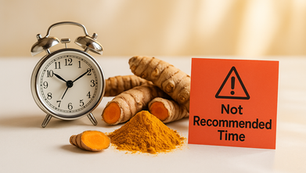top of page
Insights from Nature


Will Turmeric Cause Diarrhea or Constipation?
Turmeric (Curcuma longa) is well known for its anti-inflammatory and antioxidant properties, but many people wonder if it can upset the stomach or change bowel habits. Since turmeric curcumin supports bile production and gut function, it can affect digestion — for better or worse, depending on dosage and how it’s taken.
Let’s look at what the science says about turmeric side effects on digestion and how to enjoy its benefits without discomfort.


Turmeric Side Effects and Interactions Explained
Turmeric is not completely without side effects or interactions. While it is safe for most people when consumed as food or tea, taking concentrated forms can cause mild reactions or interact with certain medications. This comprehensive guide explains the possible side effects, who should use caution, how to minimize risks, and how to use it safely for maximum benefit.


Turmeric and Black Pepper: Why They Work Better Together
Turmeric is one of the world’s most researched herbs — celebrated for its vivid color & anti-inflammatory compound, curcumin. Yet there’s one challenge: on its own, curcumin isn’t absorbed efficiently by the body. Most of it passes through the digestive tract without reaching the bloodstream. That’s where black pepper (Piper nigrum) comes in. Its key compound, piperine, can increase the body’s ability to absorb curcumin by up to 2,000%.


Turmeric and Ginger: Double Anti-Inflammatory Power
When combined, turmeric curcumin and ginger’s gingerols and shogaols create a natural synergy that supports joint health, digestion, immunity, and even brain balance. Whether enjoyed in turmeric tea, taken as turmeric capsules, or sprinkled as turmeric powder and ginger in meals, this duo delivers real anti-inflammatory power — without the side effects often seen with conventional pain relievers.


Turmeric and Cayenne Pepper: Heat and Detox Synergy
Modern research now confirms that combining these two ingredients — turmeric and cayenne pepper — doesn’t just enhance flavor — it creates a synergistic effect that promotes circulation, metabolism, and overall vitality. Let’s explore how turmeric curcumin and cayenne pepper’s capsaicin work together to activate the body’s detox pathways, and how you can safely enjoy their benefits through turmeric supplements, turmeric tea, or turmeric powder in your daily routine.


What Happens When You Start Taking Turmeric?
Curcumin, the active compound responsible for most turmeric benefits, supports joints and immunity to promote digestion and mood balance. If you’ve just begun adding turmeric to your daily routine, you might wonder: What actually happens inside your body — and how long until you notice results? This article outlines the typical timeline of effects based on human research, so you’ll know what to expect in the first few weeks and months.


Is Turmeric Good for Children? Science-Based Safety Guidelines
Turmeric (Curcuma longa) has gained attention for its anti-inflammatory, antioxidant, and immune-supportive properties. Is turmeric safe and effective for children? Scientific and pediatric research suggests that, when used appropriately, turmeric can be beneficial for children’s immune balance, gut health, and overall resilience — though certain precautions apply. This article explores how turmeric works in children’s bodies, its evidence-based benefits, and how to use it sa


What Diseases Can Turmeric Help Support?
Turmeric (Curcuma longa), the golden spice long used in traditional healing. Scientists are investigating how this natural ingredient may help support conditions linked to chronic inflammation — the root cause of many modern diseases. Let’s explore what research says about the diseases and body systems that turmeric curcumin may support, and how everyday forms like turmeric powder, turmeric tea, and turmeric capsules can fit into a healthy lifestyle.


How to Use Turmeric for Weight Loss: Best Forms and Timing
Turmeric (Curcuma longa) has gained scientific recognition for its potential role in supporting weight management through its active compound, curcumin. But understanding how to use turmeric correctly — in the right form, amount, and combination — is essential to experience real results. This article explains practical, evidence-based ways to use turmeric for weight loss, including dosage, ideal timing, synergistic pairings, and daily preparation methods that maximize absorpt


How Long Does It Take for Turmeric to Work for Weight Loss?
One question arises frequently: “How long does it actually take for turmeric to work for weight loss?” The answer depends on multiple factors — dosage, form, diet quality, exercise, & how consistently it’s used. While turmeric is not a quick fat-burning solution, its gradual metabolic effects have been confirmed by numerous clinical studies. This article examines how long turmeric takes to produce visible results, what happens in the body during that time & how to optimize i


Is Turmeric Good for Arthritis? What Science Says About Curcumin?
Arthritis affects millions of adults globally, leading to chronic pain, stiffness, and limited mobility. While conventional medications such as NSAIDs (like ibuprofen) provide short-term relief, long-term use can cause digestive or cardiovascular side effects. This has led many people to explore turmeric (Curcuma longa), a natural herb known for its anti-inflammatory and antioxidant properties. But is turmeric truly effective for arthritis?


When Should You Not Take Turmeric?
Turmeric (Curcuma longa) is a golden spice valued for centuries for its support in inflammation balance, metabolism, and immune health. Its main bioactive compound, curcumin, provides powerful antioxidant and cellular protection benefits. However, there are times and health conditions when taking turmeric is not recommended. Understanding when to avoid it helps prevent unwanted interactions and ensures that this herb supports your body safely. Why Turmeric Isn’t Always Safe f


What Does Mayo Clinic Say About Taking Turmeric Root?
Turmeric (Curcuma longa) has become one of the most researched herbal ingredients in modern health science. It’s praised for supporting inflammation balance, joint comfort, and overall wellness. But what do medical institutions like the Mayo Clinic actually say about turmeric and curcumin supplements? This article summarizes Mayo Clinic’s professional guidance, along with scientific findings from NIH and peer-reviewed studies, to help you understand how to use turmeric safely


Turmeric and Blood Pressure Drugs: What Research Reveals
Turmeric is a well-known herbal supplement praised for its anti-inflammatory, antioxidant, and circulatory benefits. Many people who take blood pressure medication also use turmeric for joint health or general wellness. However, combining turmeric or its active compound curcumin with antihypertensive medications may cause unexpected effects. This article explains the scientific evidence, potential risks, and safe ways to use turmeric if you’re taking blood pressure medicine.


Who Should Not Take Turmeric or Curcumin?
Turmeric is a well-known spice and herbal supplement recognized for its anti-inflammatory and antioxidant properties. While turmeric is safe for most people when used in food, not everyone should take turmeric or curcumin supplements, especially in high doses. Certain health conditions and medication combinations can make turmeric unsafe or require professional supervision. Understanding these risks helps ensure turmeric is used effectively and responsibly for long-term welln
bottom of page